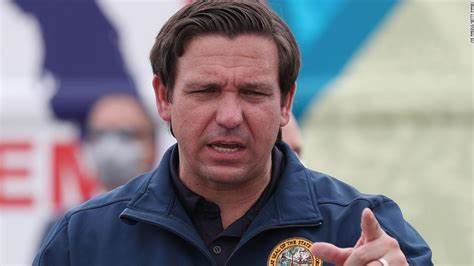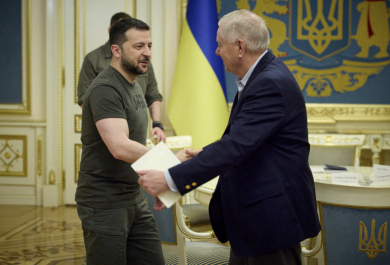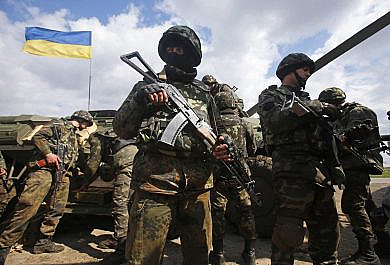Leading Republican Senators criticized likely 2024 presidential candidate Ron DeSantis after he downplayed the Russia-Ukraine conflict as a “territorial dispute” and said supporting Ukraine is not in America’s “vital national interests.”
Summary
Leading Republican Senators criticized likely 2024 presidential candidate Ron DeSantis after he downplayed the Russia-Ukraine conflict as a “territorial dispute” and said supporting Ukraine is not in America’s “vital national interests.”
- Sen. Marco Rubio, the senior senator from DeSantis’s home state, quickly distanced himself from the Florida Governor’s comments. Rubio told Hugh Hewitt America does “have an interest” in helping Ukraine as part of a broader strategy to counter China and diminish Russia.
- “Well, I don’t know what he’s trying to do or what the goal is. Obviously, he doesn’t deal with foreign policy every day as governor,” said Rubio. “So I’m not sure. … I mean, I can’t compare that to something else he did or has said over the last few years, because he doesn’t deal with it every day. But I will say to you that in terms of my view of the overall issue is I think there’s nuance, because foreign policy is about nuance.”
- Rubio appeared to mock DeSantis during his interview with Hewitt. He said, “Well, it’s not a territorial dispute in the sense that any more than it would be a territorial dispute if the United States decided that it wanted to invade Canada or take over the Bahamas. Just because someone claims something doesn’t mean it belongs to them.”
- DeSantis made his case that stopping Russia’s illegal invasion of Ukraine was not a vital national interest in a response to a questionnaire Fox News host Tucker Carlson sent to all the major GOP presidential candidates (and likely candidates).
- “While the U.S. has many vital national interests – securing our borders, addressing the crisis of readiness within our military, achieving energy security and independence, and checking the economic, cultural, and military power of the Chinese Communist Party – becoming further entangled in a territorial dispute between Ukraine and Russia is not one of them,” DeSantis said in a statement. “The Biden administration’s virtual “blank check” funding of this conflict for “as long as it takes,” without any defined objectives or accountability, distracts from our country’s most pressing challenges.”
- GOP presidential candidate Nikki Haley implicitly criticized DeSantis in a Tuesday statement setting out her views on Ukraine. “The Russian government is a powerful dictatorship that makes no secret of its hatred of America. Unlike other anti-American regimes, it is attempting to brutally expand by force into a neighboring pro-American country. It also regularly threatens other American allies,” Haley said.
- She continued, “America is far better off with a Ukrainian victory than a Russian victory, including avoiding a wider war. If Russia wins, there is no reason to believe it will stop at Ukraine. And if Russia wins, then its closest allies, China and Iran, will become more aggressive.”
- Sen. John Cornyn of Texas said he was “disturbed” by DeSantis’s statement. “I think he’s a smart guy. I want to find out more about it but I hope he feels like he doesn’t need to take that Tucker Carlson line to be competitive in the primary,” Cornyn continued.
- Sen. Lindsey Graham of South Carolina said DeSantis was “missing a lot” and implicitly compared him to Neville Chamberlain, the British Prime Minister who appeased Adolf Hitler in the run-up to World War II.
- “When an American leader tells an adversary what they will NOT do in a conflict, it sends a signal of weakness and generally prolongs the conflict making it more likely to spread,” Graham said. “We had eight years of Obama sending mixed signals to our enemies that led to more aggression. We do not need to go down that path again.”
![]()
- The New York Times noted DeSantis and former President Donald Trump are now largely aligned on Ukraine, and their combined support makes up more than 75% of Republican primary voters at this point in the contest. The Times also picked up Graham’s comments bashing DeSantis’s policy as “the Neville Chamberlain approach to aggression.”
- The Washington Post noted DeSantis’s stance sets him apart from both Senate Minority Leader Mitch McConnell (R-KY) and from party icon Ronald Reagan, who’s strong anti-Soviet posture is a far cry from DeSantis’s more isolationist positioning.
- According to CBS News, several GOP presidential candidates responded to Carlson’s six questions, including Trump, DeSantis, Haley, former Vice President Mike Pence, biotech entrepreneur Vivek Ramaswamy, South Dakota Gov. Kristi Noem, Texas Gov. Greg Abbott, South Carolina Sen. Tim Scott and former New Jersey Gov. Chris Christie.
![]()
- National Review’s Noah Rothman argued that DeSantis’s claims that his Ukraine views are based on US strategic interests, his position is not “predicated on an understanding of America’s permanent interests abroad or on principle” – instead, its “pure politics.” Rothman believes DeSantis will “struggle to defend” this position and it could become a “significant liability” for him should he become the GOP presidential nominee.
- Commentary’s John Podhoretz characterized DeSantis’s statement as giving “in to temptation.” The Florida Governor’s decision to align himself with the Tucker Carlson wing now “completely contradicts several years of hawkishness on his own part when it came to staring down Russia on the matter of Ukraine.” DeSantis’s decision to listen to the loudest voices on social media – instead of opinion polls of GOP voters – is “a bad sign for DeSantis, who needs to run his own race.”
- The Federalist’s Shawn Fleetwood praised DeSantis’ call for “de-escalation” to try and find a “peaceable solution to the conflict.” Fleetwood then went on to praise the ire DeSantis’s remarks evoked from “neocons, who have emotionally latched themselves onto Ukraine…like a magnet” while simultaneously mocking how “irrelevant” their disapproval is. Neither Fleetwood nor DeSantis have said how they would find this “peaceable solution” – you could call Fleetwood’s views the “yada yada yada” theory of international relations.
© Dominic Moore, 2023






